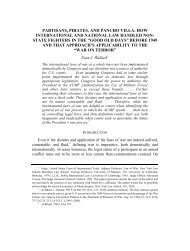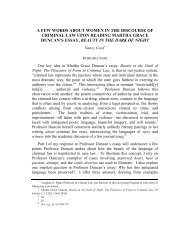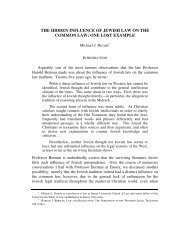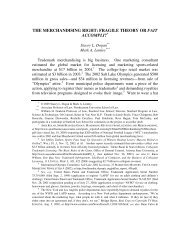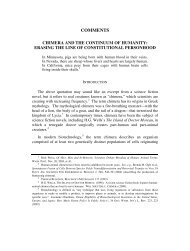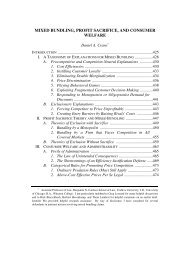life, liberty, and the pursuit of swords and armor - Emory University ...
life, liberty, and the pursuit of swords and armor - Emory University ...
life, liberty, and the pursuit of swords and armor - Emory University ...
You also want an ePaper? Increase the reach of your titles
YUMPU automatically turns print PDFs into web optimized ePapers that Google loves.
1332 EMORY LAW JOURNAL [Vol. 57<br />
impression that with EULA law as it st<strong>and</strong>s, players will remain without<br />
property rights in virtual goods. 205 And without property rights, a state’s <strong>the</strong>ft<br />
prosecution will fail.<br />
None<strong>the</strong>less, <strong>the</strong>re are many scholars who believe that certain sections <strong>of</strong><br />
MMORPG EULAs are invalid, making <strong>the</strong> EULAs unenforceable. 206 These<br />
scholars argue that EULAs should protect <strong>the</strong> developers’ intellectual property<br />
rights over virtual goods <strong>and</strong> nothing else, retaining for video game players <strong>the</strong><br />
right to use, possess, enjoy, <strong>and</strong> exclude virtual goods. 207 One scholar in<br />
particular argues that MMORPG EULAs place an unreasonable restraint on<br />
virtual goods, limiting <strong>the</strong> property to low-value uses 208 —a limitation not<br />
allowed by U.S. courts. 209 O<strong>the</strong>r scholars argue that <strong>the</strong> EULAs are<br />
substantially unconscionable—<strong>and</strong> thus invalid—because <strong>the</strong> terms unduly<br />
favor <strong>the</strong> developers, 210 <strong>the</strong> distribution <strong>of</strong> property falls outside <strong>the</strong> players’<br />
expectations, 211 <strong>the</strong>re is a lack <strong>of</strong> business necessity for such harsh terms, 212<br />
<strong>and</strong> <strong>the</strong> distribution <strong>of</strong> MMORPG s<strong>of</strong>tware should not involve licensing. 213<br />
Finally, ano<strong>the</strong>r scholar argues that if courts do not find EULAs unenforceable,<br />
<strong>the</strong>n public policy will force legislatures to step in <strong>and</strong> regulate both <strong>the</strong><br />
formation <strong>and</strong> enforceability <strong>of</strong> MMORPG EULAs. 214<br />
205 Chein, supra note 80, at 1090.<br />
206 See, e.g., Lastowka & Hunter, supra note 48, at 50 (arguing that EULAs place excessive restraints on<br />
product users).<br />
207 See Fairfield, supra note 70, at 1083–84; see also Schwarz & Bullis, supra note 109, at 25–28 (arguing<br />
that Sony’s virtual goods market exchange that excludes o<strong>the</strong>r third-party market sales may constitute an<br />
antitrust violation, thus invalidating its current EULA formulation).<br />
208 Fairfield, supra note 70, at 1083–84.<br />
209 See Glen O. Robinson, Personal Property Servitudes, 71 U. CHI. L. REV. 1449, 1480 n.111 (2004)<br />
(“The common law has invalidated restraints on alienation <strong>of</strong> property from time out <strong>of</strong> mind.”).<br />
210 Meehan, supra note 8, at 23.<br />
211 Id.; see also Bobby Glushko, Note, Tales <strong>of</strong> <strong>the</strong> (Virtual) City: Governing Property Disputes in Virtual<br />
Worlds, 22 BERKELEY TECH. L.J. 507, 527–30 (2007) (stating that developer-drafted EULAs favor developers<br />
<strong>and</strong> do not meet player expectations as to legal liability <strong>and</strong> enforcement); Steven J. Horowitz, Note,<br />
Competing Lockean Claims to Virtual Property, 20 HARV. J.L. & TECH. 443, 457–58 (2007) (arguing that<br />
while players operate under Lockean conceptions <strong>of</strong> property, operators <strong>of</strong> virtual worlds do not).<br />
212 Meehan, supra note 8, at 24.<br />
213 S<strong>of</strong>tman Prods. Co. v. Adobe Systems Inc., 171 F. Supp. 2d 1075, 1085 (C.D. Cal. 2001) (finding that<br />
<strong>the</strong>re was no license, but instead a sale, because “<strong>the</strong> purchaser . . . obtain[ed] a single copy <strong>of</strong> <strong>the</strong> s<strong>of</strong>tware,<br />
with documentation, for a single price, which <strong>the</strong> purchaser pay[ing] at <strong>the</strong> time <strong>of</strong> <strong>the</strong> transaction, . . . which<br />
constitute[d] <strong>the</strong> entire payment for <strong>the</strong> ‘license[]’ [<strong>and</strong>] [t]he license runs for an indefinite term without<br />
provisions for renewal”). If in fact licensing does not apply to MMORPGs, <strong>the</strong>n video game players could<br />
argue that <strong>the</strong>y have <strong>the</strong> freedom to buy <strong>and</strong> sell virtual goods because <strong>of</strong> <strong>the</strong> first sale doctrine. See supra<br />
note 194.<br />
214 Jack M. Balkin, Virtual Liberty: Freedom to Design <strong>and</strong> Freedom to Play in Virtual Worlds, 90 VA. L.<br />
REV. 2043, 2071–72 (2004). But see Westbrook, supra note 94, at 803–04 (arguing that public policy is not<br />
overwhelmingly opposed to current MMORPG EULA provisions).




